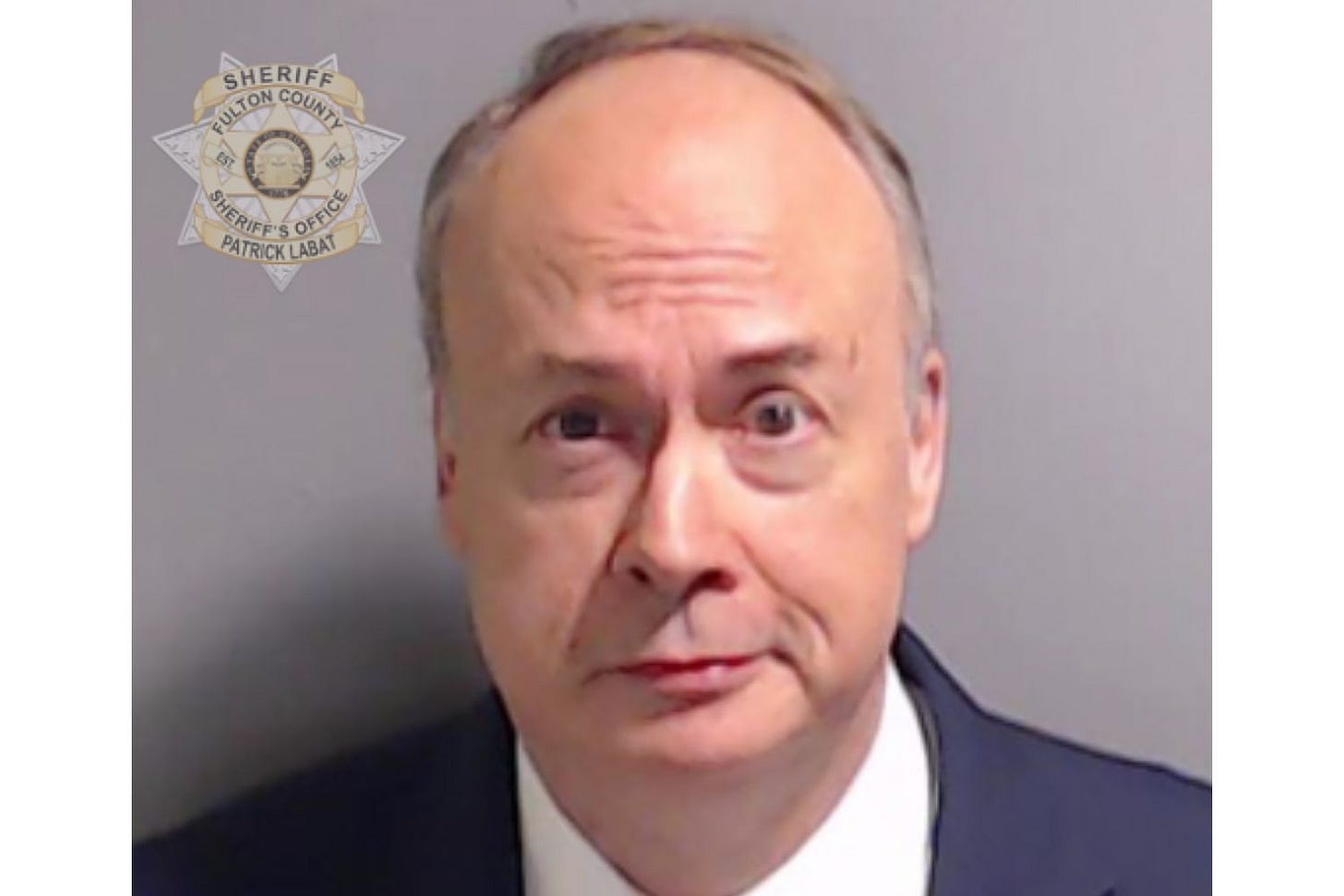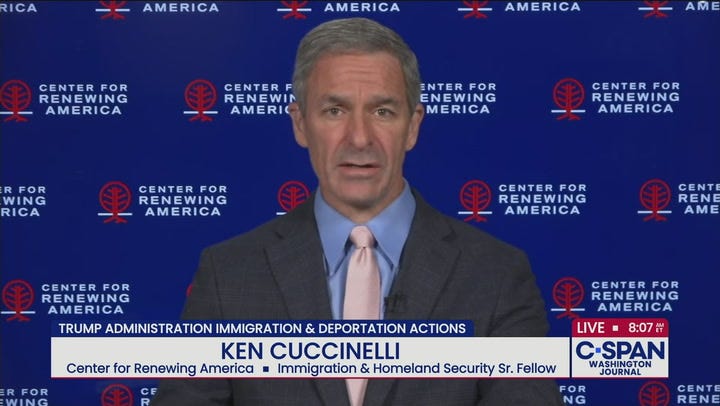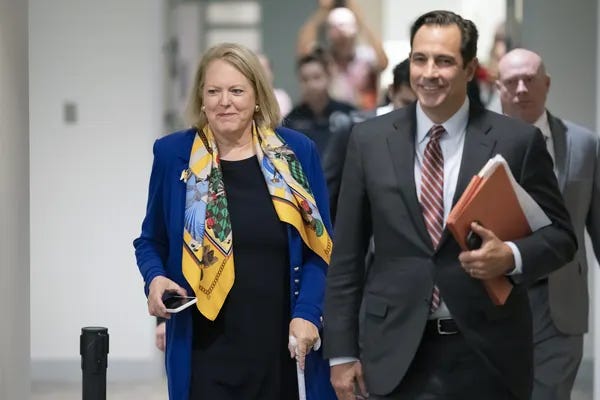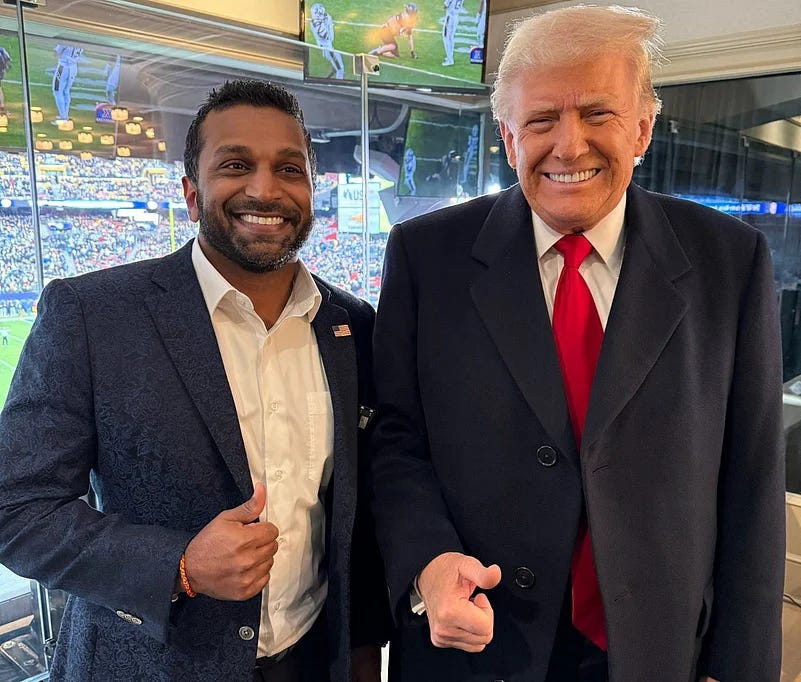A Deep Dive on Russell Vought, MAGA's Most Dangerous Holy Warrior (Part 2)
Russell Vought's Lieutenants
Introduction
If you have not already, I highly suggest that you read Part 1 of this series first. Part 1 describes Russell Vought’s early career, his activities during the first Trump Administration, and his establishment of the Center for Renewing America (CRA) and its activities throughout 2021. For this post, I had initially intended to cover Vought’s activities in 2022 and the initiation of Project 2025. However, as I continued my research, several other names kept popping up that have several things in common: direct association with Vought and the CRA, participation in the January 6 insurrection, involvement with Project 2025, and key roles in the first and/or second Trump Administration. In addition, several readers directly contacted me and asked me to cover some of these individuals. Many of my readers are current or former federal employees who have either had direct interaction with these individuals or, at the very least, have been impacted by their policy positions. Therefore, this post will focus mostly on Vought’s hand-picked team (whom I call his Lieutenants) at CRA.
Key Members of the Center for Renewing America
Jeffrey Clark
Jeffrey Clark was a relatively obscure, mid-level lawyer in the Department of Justice during the first Trump Administration who became infamous after the 2020 election for attempting to use DOJ’s official authority to support Trump’s election challenges. Specifically, Clark drafted a letter to governors and legislative leaders in key swing states falsely claiming that the Department of Justice was investigating “voting irregularities.” The letter urged those officials to convene special legislative sessions and consider submitting alternate slates of electors for Donald Trump ahead of the Electoral College certification on January 6, 2021. According to Axios, Clark was the only senior DOJ official willing to use the Department’s resources to advance Trump’s election claims.
Trump even considered appointing Clark as Attorney General after William Barr resigned in December 2020 and Barr’s replacement, Acting Attorney General Jeff Rosen, refused to involve the DOJ in Trump’s efforts. However, Trump backed down when senior DOJ leaders threatened to resign en masse if Clark was appointed. Subsequently, in January 2021, Clark was hired by Vought to be CRA’s Director of Litigation
In February 2022, Clark was subpoenaed for a deposition before the House January 6 Committee to discuss his role in the post-election period and the lead-up to the Capitol attack. He repeatedly invoked his Fifth Amendment right against self-incrimination and declined to answer questions.
On June 22, 2022, FBI agents conducted a pre-dawn search of Clark’s home, escorting him outside in his pajamas and seizing his electronic devices. Vought quickly appeared on podcasts and Fox News programs to condemn the raid, saying:
Quoting Vought: “More than a dozen DOJ law enforcement officials searched Jeff Clark’s house in a predawn raid, put him in the streets in his PJs, and took his electronic devices. All because Jeff saw fit to investigate voter fraud. This is not America, folks. … We stand by Jeff and so must all patriots in this country.”
Clark was later indicted in Georgia alongside Trump and other allies for his role in attempting to overturn the 2020 election and was booked into the Fulton County Jail on August 25, 2023.
Trump’s victory in the 2024 election effectively quashed pending January 6-related prosecutions. He issued pardons for those already convicted, allowing Clark to escape justice for his role in the effort to subvert the 2020 results.
At CRA, Clark became a key contributor to Project 2025. He spearheaded planning for the invocation of the Insurrection Act and the D.C. Home Rule Act, which would allow a president to deploy military personnel domestically and assume control of Washington, D.C.’s police forces. Trump has already invoked these powers to deploy the military to Los Angeles and Washington, D.C. in response to alleged crime waves. Clark also played a central role in Vought’s “personnel is policy” strategy, making staffing recommendations to purge career officials and replace them with MAGA loyalists, particularly at DOJ.
In the current Trump Administration, Clark serves under Vought at the Office of Management and Budget (OMB) as the Administrator of the Office of Information and Regulatory Affairs (OIRA).
Ken Cuccinelli
Ken Cuccinelli served as Attorney General of Virginia from 2010 to 2014 and was previously a Virginia state senator. After leaving office, he largely disappeared from the public spotlight until resurfacing in late 2019 during the first Trump Administration, when Trump appointed him as Acting Director of U.S. Citizenship and Immigration Services (USCIS) and later as Acting Deputy Secretary of the Department of Homeland Security (DHS). Both appointments were structured as “acting” roles to bypass Senate confirmation, since even Senate Republicans made clear that Cuccinelli could not win confirmation. A federal judge ruled his USCIS appointment unlawful, and the Government Accountability Office reached the same conclusion regarding his DHS post. Nonetheless, he remained in both roles until the end of Trump’s term.
Cuccinelli became notorious for two actions during the COVID-19 pandemic. First, in July 2020, he attempted to deport foreign students who were not attending in-person classes, as many universities shifted to online instruction. He argued that foreign students could just as easily take their courses online “in their own countries.” Second, he directed DHS analysts to alter intelligence reports to downplay the rising threat of white nationalist groups in the United States, such as the Proud Boys and the Oath Keepers. This effort gained public attention when, during the first 2020 presidential debate, Joe Biden urged Trump to denounce such groups—prompting Trump’s infamous line telling the Proud Boys to “stand back and stand by.” Both the Proud Boys and Oath Keepers were heavily represented among the January 6th insurrectionists at the Capitol, and Trump has since pardoned both groups, along with all other insurrectionists. Cuccinelli’s own role in January 6 remains unclear, in part because he switched to using the encrypted messaging app Signal on his personal phone after the 2020 election, a practice that would also become a hallmark among Cabinet members in Trump’s second Administration.
After leaving government, Cuccinelli joined the CRA as Senior Fellow for Immigration and Homeland Security. It was, again, mostly a no-work job, as Cuccinelli authored around a dozen articles over a 4 and a half year period. This is, however, substantially more productive than Kash Patel, whom I will describe later. Cuccinelli also wrote the Project 2025 blueprint for DHS, much of which shaped the department’s current agenda. Vought embraced Cuccinelli’s legally dubious argument that illegal border crossings could be declared a “military invasion” by foreign nations, a framing that, once again, allows Trump to expand federal police powers domestically.
Cuccinelli fell out of Trump’s favor in 2023 after founding the “Never Back Down” super PAC supporting Ron DeSantis’s 2024 presidential campaign. As a result, the DHS leadership role that might otherwise have gone to him instead went to Kristi Noem.
Mark Paoletta
Mark Paoletta has been active in conservative politics for decades, beginning with the George H. W. Bush Administration, where he served as Assistant Counsel to the President and was a “key figure” in Clarence Thomas’s 1991 confirmation as a Supreme Court Justice. Paoletta subsequently became close friends with Justice Thomas and his wife, Ginni. From 1997 to 2007, he served as Chief Counsel for Oversight and Investigations on the U.S. House Energy and Commerce Committee.
In the first Trump Administration, Paoletta was Chief Counsel to Vice President Mike Pence. As with Clarence Thomas, Paoletta was, once again, a “key figure” in preparing Justices Neil Gorsuch and Brett Kavanaugh for their Senate confirmation hearings. More importantly, he functioned as a sort of middle man between Donald Trump and Clarence Thomas. Traditionally, Supreme Court justices are expected to remain outside politics, meaning Justice Thomas could not openly exert influence within the Trump Administration. Ginni Thomas, however, faced no such restrictions. According to Axios, she “had assembled detailed lists of disloyal government officials to oust — and trusted pro-Trump people to replace them.” She voiced her complaints directly to White House officials, including Paoletta, arguing that government employees were insufficiently loyal to the MAGA agenda.
Ginni Thomas is Paoletta’s direct connection to the January 6 insurrection. She sent 29 text messages to Trump’s Chief of Staff, Mark Meadows, in December 2020, urging Trump to overturn the election and calling it “the greatest heist in our history.” She also emailed Republican state legislators in Arizona and Wisconsin, urging them to submit alternate slates of pro-Trump electors. On January 6, 2021, Ginni attended the “Stop the Steal” rally, though she did not enter the Capitol. All of this unfolded while Clarence Thomas was weighing multiple Supreme Court cases related to the 2020 election. Unsurprisingly, the House Select Committee investigating January 6 called her to testify in 2022. Throughout this period, Ginni Thomas retained Paoletta as her personal lawyer, with him serving both legal and public relations roles.
In January 2018, Paoletta became General Counsel for OMB, where he began working with Vought. Paoletta provided the foundation for Vought’s legal strategy to circumvent the Impoundment Control Act (ICA). The ICA, passed in 1974 after President Nixon withheld congressionally appropriated funds from programs he opposed, restricts the President’s ability to impound funds. Paoletta and Vought argued that the ICA is unconstitutional, asserting that the President has broad Article II powers that include withholding funds. The ICA allows the President to propose rescissions of previously appropriated funds, but if Congress does not approve within 45 days, the funds must be released. During that period, however, OMB instructs agencies not to spend the funds, regardless of congressional action.
This feature enables a tactic Vought intends to deploy in a second Trump Administration called “pocket rescissions.” A pocket rescission allows the administration to effectively cut or reallocate spending without congressional approval. Most funding that Congress appropriates is on a specific timeline — often one year. Any Congressionally-appropriated funds that are not spent by the end of the fiscal year (September 30) are “lost” to the agency and returned to the Treasury. Thus, when Vought wants to cut spending, OMB can submit a rescission proposal roughly 45 days before September 30, instructing agencies to withhold funds during that time. By the time the 45 days expire, the fiscal year has ended, and the money is no longer available to the agencies—effectively canceling the funding without Congress’s consent.
Paoletta joined the CRA at its founding in January 2021. Five articles appear under his name on the CRA website. Three, published in 2021, were cross-posted from Breitbart and The Federalist, where Paoletta had written opinion pieces. One piece complained that Amazon Prime removed a Clarence Thomas documentary (for which he co-edited the book adaptation) during Black History Month, despite CRA’s anti-DEIA policy stance. His other two articles focused on the Impoundment Control Act and strategies to circumvent it. In the second Trump Administration, Paoletta returned to OMB as its Chief Counsel.
As far as I can tell, Paoletta did not author any chapters of the Project 2025 manifesto. However, he has played a significant role in implementing Project 2025 and the DOGE agenda within the federal government. For example, according to DeSmog, in January 2025 Paoletta drafted a memo that abruptly froze trillions of dollars in federal grants and loans across more than 2,500 programs. Chaos immediately ensued, as Medicaid, Head Start programs, food banks, and community organizations suddenly lost access to funding. Federal judges quickly intervened, issuing injunctions against the freeze. The freeze was almost universally unpopular among the American populace. Showing true leadership, Trump disavowed knowledge of the memo. All of this occurred within the two weeks of his second Administration.
Kash Patel
Before 2020, Kash Patel was a virtually unknown staffer for Devin Nunes, then chair of the House Intelligence Committee. Patel’s role on Nunes’s staff was to investigate the conduct of Robert Mueller’s probe into Russian interference in the 2016 election and possible connections to the Trump campaign. That investigation culminated in a memo, authored by Patel and released by Nunes, accusing the Obama DOJ of conspiring with the Clinton campaign in a politically motivated effort to derail Trump’s candidacy and presidency. This memo, incidentally, has become the basis for Trump’s recent threats to arrest Barack Obama.
Nunes and Patel’s efforts became the subject of Lee Smith’s book The Plot Against the President, later adapted into a documentary of the same name released on Amazon Prime in September 2020. Patel, alongside Nunes, was heavily featured and lionized as a heroic figure in the film, which gained significant popularity among the MAGA faithful. This propelled Patel from obscurity into Trump’s inner circle. In the chaotic weeks following the 2020 election, Trump even considered appointing Patel deputy director of the FBI to investigate election fraud claims. He ultimately backed down after his own Cabinet threatened to revolt. Instead, Patel was named Chief of Staff to acting Secretary of Defense Chris Miller.
Patel took full advantage of his newfound fame by launching a conservative media and merchandising brand. He started a podcast, Kash’s Corner, rolled out a “K$h” product line, and published a children’s book retelling his Mueller investigation, featuring such characters as “King Donald” and “Hillary Queenton.” He also became a regular guest on the MAGA podcast circuit, where he infamously claimed that the FBI possessed the complete Epstein files and was deliberately withholding them from the public—a claim that would come back to haunt him years later.
In 2021, Russell Vought hired Patel as the Center for Renewing America’s “Senior Fellow for National Security and Intelligence.” By all appearances, this was one of the no-work “ mere job providers” I referred to in my previous post. The only visible contribution Patel made to CRA, aside from attending fundraising events at Mar-a-Lago, was a single article co-authored with Project 2025 senior advisor Troup Hemenway in February 2023. The article was no longer than the typical article I write for free on this Substack (with no co-authors), but somehow CRA found it worth paying Patel a salary for several years.
Patel, as far as I can tell, had no direct involvement in Project 2025 in the sense that he didn’t author or co-author any chapters of the manifesto. However, like Clark, he follows Vought’s “personnel is policy” strategy of replacing career bureaucrats with MAGA loyalists, and made many recommendations as Trump regarding reforming the National Security apparatus (e.g. CIA, FBI, NSA).
Within the current Trump Administration, Trump appointed Patel to be his FBI Director. When it became clear that Trump is much more deeply connected to Jeffrey Epstein than previously thought, Patel once again made appearances on the MAGA podcast circuit, this time claiming that the Epstein files essentially do not exist. Nothing to see here. Move along.
More to Come
Vought’s hand-picked lieutenants at the CRA reveal a lot about his character, intentions, and strategy. He deliberately chose people who were, in varying degrees, directly associated with the January 6 insurrection and essentially unemployable for accomplishing honest work. All of his lieutenants are like-minded in terms of Vought’s “personnel is policy” strategy of attempting to replace as many non-political career bureaucrats with partisan MAGA loyalists. Finally, all of his lieutenants, and Paoletta in particular, are not above using extralegal procedural maneuvers (i.e. pocket rescissions) to accomplish their political ends.
Part 3 of this series covering Project 2025 and Vought’s activities during the 2023/2024 campaign cycle has been released here.
Part 4 of this series covering an interview Vought did with Tucker Carlson shortly after the election where he outlines his plans for the Second Trump Administration has been released here.
Part 5 of this series covering the first few months of the Second Trump Administration and, specifically, conflict between Elon Musk’s DOGE and Vought’s Project 2025 has been released here.






Thank you for this well researched & thoughtful article.
I had no real understanding of Vought’s Darth Vader behind the scenes as the shadow president. I’m looking forward to the next article.
I don’t know if you will read this, but how if possible can we fight this authoritarian white supremacy cloaked as Christianity? As of late project 2025 is out in the open mocking & demeaning us. I’m disgusted & want to do something, but I don’t know what to do.
You have helped me understand that this regime includes much more than Trump, Stephan Miller, Kash Patel, etc…
I hope more independent journalists expose the evil players behind The Orange Felon in the White House!
Servants of the Antichrist